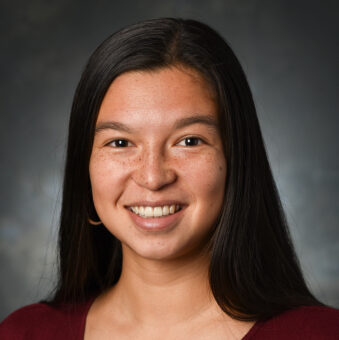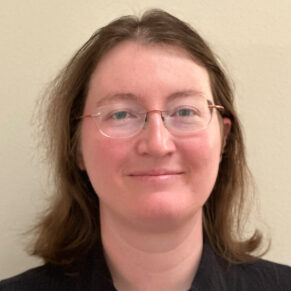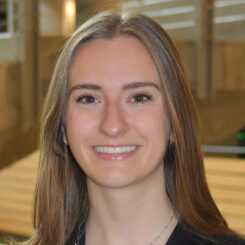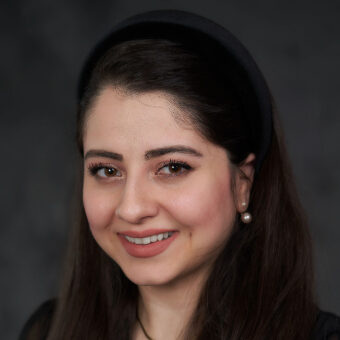
The US Department of Energy (DOE) Building Technologies Office (BTO) has selected the 2024 cohort of Innovation in Buildings (IBUILD) Graduate Research Fellows.
The goal of the IBUILD Fellowship Program is to strengthen the pool of well-trained PhD scholars with multidisciplinary scientific backgrounds who are equipped for research-intensive building technologies careers in academia, industry, and the national labs. IBUILD Fellows will receive research and educational support to conduct innovative research at their home institution in an area with demonstrated relevance to building energy efficiency. In addition to funding high quality research, the fellowship will provide professional development, mentoring, and networking opportunities.
Meet the 2024 Cohort

Hannah Arnow
Hannah Arnow is a third-year PhD student at Rensselaer Polytechnic Institute (RPI) studying mechanical engineering. Her research focuses on improving building-integrated photovoltaics through luminescent solar concentrators integrated with asymmetric light transmitting interfaces. She began her research on solar energy harvesting as an undergraduate at RPI. Hannah is a recipient of a Boeing Fellowship.

Erin Blackley
Erin Blackley is a third-year PhD student at Colorado School of Mines in the inter-disciplinary Advanced Energy Systems program, a partnership with the National Renewable Energy Laboratory (NREL). She holds a bachelor’s degree in chemical engineering with a concentration in sustainable energy systems from Northeastern University.
Erin’s research focuses on expanding the accessibility of electrified systems in low-income housing by enabling the integration of thermal energy storage into heat pump water heaters. Her work involves the design, optimization, and testing of additively manufactured heat exchangers containing phase change materials for use in small-volume units.

Ethan Hartley
Ethan Hartley is a fourth-year PhD student in the Department of Economics at the University of Hawai‘i at Mānoa. His research interests are centered on environmental and energy economics with an emphasis on computational modeling and causal inference.
Ethan’s research focuses on co-optimization of national power system planning and building management systems. He is using a linear programming–based capacity expansion model, Switch 2.0, to evaluate pricing mechanisms, policies, and building management strategies that incentivize flexibility and aid decarbonization efforts. His work aims to address the timing of consumption as a critical component to building efficiency and to provide insights on the heterogeneity of optimal management strategies and policies across regions with varying renewable generation potentials and climatic idiosyncrasies.

Julia Lien Ho
Julia Ho is a second-year architectural engineering PhD student at The Pennsylvania State University and holds a bachelor of science in civil engineering from The University of Texas at Austin. She is the social chair of the Penn State Architectural Engineering Graduate Student Association, where she aims to foster supportive relationships between graduate students, faculty, and staff for a healthier and more connected work environment.
Julia’s research project focuses on developing a modeling toolkit that evaluates and optimizes low-carbon thermal energy systems for rural areas. Her project attempts to determine how advanced modeling tools can be leveraged to assess the readiness of rural communities are for building decarbonization efforts as well as how to sustainably improve rural areas’ heating and cooling infrastructure at the community scale.

Kathryn Jones
Kathryn Jones is a fourth-year PhD student at the University of California-Irvine. Kathryn is working on developing sustainable, high-performance, cementitious materials suitable for concrete additive manufacturing that are designed using a life cycle assessment framework. Her current work seeks to understand the potential of using recycled materials as fine aggregate and supplementary cementitious materials in high-performance 3D printable cementitious materials.
Kathryn hails from Boulder, Colorado, where she grew up happily hiking through the mountains and dipping her fingers in as many engineering specialties as she could. Her interest in multidisciplinary work and the natural world has guided her toward a research career focused on mitigating climate change, which she currently pursues via projects focused on concrete 3D printed infrastructure. When not working in the lab, Kathryn enjoys riding her bike around Irvine, California, and taking advantage of the thriving Southern California food scene.

Bernadette Magalindan
Bernadette Magalindan is a third-year mechanical engineering PhD student at The University of Texas at Dallas. Bernadette hopes to decarbonize the thermoregulation of buildings through passive mechanisms: radiative cooling and thermal energy storage. In her research, she is investigating how these two technologies synergize to bring occupant comfort while reducing space cooling loads. She is exploring how such material can be synthesized using low-value waste wood to promote a circular economy.
Bernadette was an Energy Storage intern at the National Renewable Energy Laboratory (2023), a National Science Foundation Student Participation awardee at the 17th International Conference on Energy Sustainability.

Madeline Morrell
Madeline Morrell is a second-year PhD student in mechanical engineering at Georgia Institute of Technology. She obtained her bachelor of science in mechanical engineering, certificate in international engineering, and certificate in engineering for energy sustainability from the University of Wisconsin–Madison. Madeline’s research focuses on thermochemical energy storage for offsetting or shifting thermal loads in buildings and involves characterizing different materials with thermomechanical stability and developing system designs for HVAC integration for heating, cooling, and dehumidification applications.

Sameeraa Soltanian-Zadeh
Sameeraa Soltanian-Zadeh is a third-year PhD student in mechanical and aerospace engineering at Syracuse University. She received her master’s degree in building engineering from Politecnico di Milano in Milan, Italy, and her bachelor’s degree in architectural engineering from University of Tehran in Tehran, Iran. As a woman in engineering, she is committed to bridging gender gaps in science, technology, engineering, and mathematics.
Sameeraa’s research focuses on indoor air quality and urban environmental dynamics, highlighting the effects of occupant behaviors on indoor air quality and building energy efficiency. By examining diverse building types across different communities and income levels, her research contributes to environmental justice, offering insights for public health, energy efficiency, and sustainable urban development, especially regarding the role of building occupants.
Finalists
The IBUILD Fellowship team also recognizes four finalists who distinguished themselves during the application and interview process. Although they will not receive direct financial support, they will be able to take advantage of mentoring, networking, and professional development opportunities as part of the IBUILD Community.
Michael Huylo
Michael Huylo is a third-year PhD student in the Department of Civil, Architectural and Environmental Engineering at the University of Texas at Austin. His research involves the optimal integration of distributed energy resources into campus microgrid systems.
Denali Ibbotson
Denali Ibbotson is a third-year materials science and engineering PhD student at Texas A&M University. Her research focuses on developing and characterizing different phase change materials for use in thermal energy storage systems. She also aims to develop a better understanding of different nucleation pathways in these systems.
Kristi Maisha
Kristi Maisha is a first-year civil and environmental engineering PhD student at Stanford University. She works in the Urban Informatics Lab conducting research on improving the occupant experience in and energy efficiency of commercial buildings.
James Perez-Vazquez
James Perez-Vazquez is a first-year chemistry PhD student at Texas A&M University. His research will focus on modulating heat exchange to increase energy efficiency in buildings with thermochromic coatings that leverage the metal–insulator transition of vanadium oxides.